
Church leaders are worried over the ongoing exodus of millennials from Christian churches. The Daily Show correspondent Ronny Chieng takes a look at some of the different ways churches and pastors are trying to reach young adults. Enjoy!

Church leaders are worried over the ongoing exodus of millennials from Christian churches. The Daily Show correspondent Ronny Chieng takes a look at some of the different ways churches and pastors are trying to reach young adults. Enjoy!
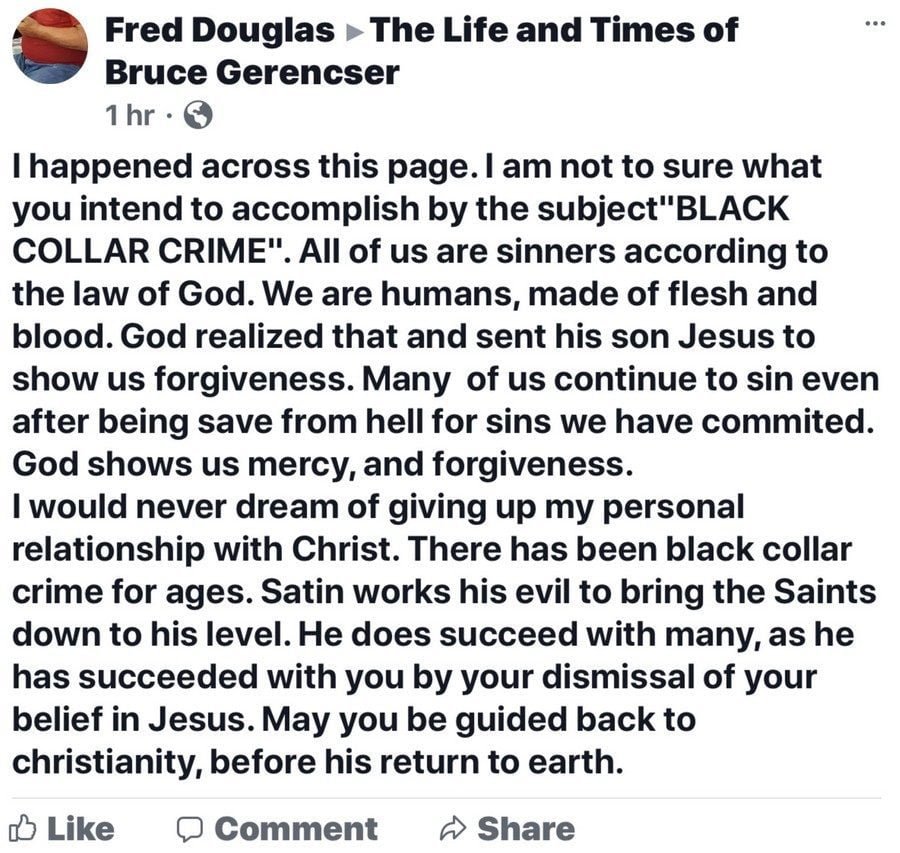
A man who lives not far from my home left the above comment on my Facebook page (if you have not yet LIKED the Life and Times of Bruce Gerencser page, I would appreciate you doing so.) Based on a bit of social media stalking, I have determined the commenter is retired and is a King James-Only Baptist. That he is a Baptist gave me a bit of context as I determined how best to respond to his comment. Last year, emergent church guru Brian McLaren said:
I feel that the role of Baptists — not Cooperative Baptist Fellowship but other Baptists — in doing harm to our nation and world is so great. I really feel well-meaning, sincere people who are deeply committed to the term ‘Baptist’ are often at the forefront of being careless about the environment. They are often at the forefront of being hateful towards Muslims. They are often at the forefront of promoting — unconsciously very often — white supremacy and continuing harm being done to racial minorities. We don’t even need to mention the harm being done to LGBTQ persons.
….
I think one of our great challenges in the Christian religion at large is for Christianity to grow up, to be a world religion meaning not just an American religion and certainly not just a southern or rural American religion, but a religion that grapples with all the challenges of our interconnected world.
In my mind, the underlying issue is actually patriarchy. We could talk about white Christian supremacy, but at the core of this is white, Christian, patriarchal supremacy. It’s a way of organizing life around powerful men.
A whole lot of people are wondering, can the Christian religion extract itself from patriarchy, or is belief in God the Father, Son and Holy Spirit so inherently patriarchal that Christians actually believe in a patriarchal universe?
….
Watching the success of Donald Trump win over especially white people, and especially white Christians and especially white evangelical and Baptist Christians, in my opinion this is a pivotal moment.
Baptists, those damn Baptists. Their theology fuels the continued support of the pussy-grabbing, adulterous president of the United States, Donald Trump. Franklin Graham and Robert Jeffress — both are Baptists — continue to defend Trump against accusations of rape, sexual assault, and adultery. It was primarily the Baptists who held the line of defense for Independent Fundamentalist (IFB) Baptist pervert Roy Moore. (Keep in mind, many generic Evangelical churches are Baptist in everything but their name.) According to Baptist theology, there’s no sinful act that can kick you out of the family of God once Jesus has saved you and the Father has adopted you into his family. This is why more than a few Evangelicals believe that I am still a Christian. Once saved, always saved; once married to Jesus, no divorce. This is why serial killers Jeffrey Dahmer and Ted Bundy went to heaven when they died. No matter the sin, if your soul has been washed in the blood of Jesus, you are forever a child of God.
Thus, for the aforementioned commenter, there’s no good reason for publishing the Black Collar Crime Series. Yes, Evangelical pastors, deacons, Sunday school teachers, worship leaders, and church congregants can and do rape women, sexually assault children, and commit all sorts of sexual crimes, and as long as these saved-by-grace Christians are in the flesh, they can and do sin. But, no matter what they do, God will forgive them. That’s what so w-o-n-d-e-r-f-u-l about Evangelical soteriology; forgiveness is only a prayer away.
Evangelicals are frequently reminded of 1 John 1:9: “If we confess our sins, he is faithful and just to forgive us our sins, and to cleanse us from all unrighteousness.” No matter what Evangelicals do, the most-awesome-God-ever stands ready and willing to grant forgiveness. Awesome, right? No matter how heinous the crime or behavior, Evangelicals are just a prayer away from a clean slate.
The commenter reminds me that all of us are sinners, and that Christians often continue to sin after they are saved. If this is so, why bother to get saved; why read the Bible, pray, tithe, and attend church on Sundays if the new birth doesn’t turn sinners into new creations (as the Bible says it most certainly does)? Of course, according to the commenter, sinning Evangelicals aren’t really to blame for their sinfulness — Satin is. Those damn satin sheets I just knew that they would lead to the fall of the human race. Humor aside, I’m sure the commenter meant SATAN was to blame for the sexual sins and crimes detailed in the Black Collar Crimes Series. Doesn’t the Bible say of believers, “greater is he (God) that is in us than he (Satan) that is in the world?” Doesn’t the Bible say that Christians are overcomers and have victory in Christ? Doesn’t the Bible say that Evangelicals who sin are of the Devil and Christ does not abide in them? Doesn’t the Bible say that faith without (good) works is dead (and I assume sexually assaulting children and raping women are not good works)?
It seems, then, that the commenter has a problem with the Bible. Perhaps his bankrupt Baptist theology has warped his thinking, leading him to believe that Christians can be perverts and adulterers and still make it to God’s Trump Hotel in the Sky®. I wonder if he has read 1 Corinthians 6:9-11:
Know ye not that the unrighteous shall not inherit the kingdom of God? Be not deceived: neither fornicators, nor idolaters, nor adulterers, nor effeminate, nor abusers of themselves with mankind, Nor thieves, nor covetous, nor drunkards, nor revilers, nor extortioners, shall inherit the kingdom of God. And such were some of you: but ye are washed, but ye are sanctified, but ye are justified in the name of the Lord Jesus, and by the Spirit of our God.
And such were (past tense) some of you, the Apostle Paul says.
Revelation 21:27 and 22: 14,15 says:
And there shall in no wise enter into it [New Jerusalem] any thing that defileth, neither whatsoever worketh abomination, or maketh a lie: but they which are written in the Lamb’s book of life.
Blessed are they that do his commandments, that they may have right to the tree of life, and may enter in through the gates into the city. For without are dogs, and sorcerers, and whoremongers, and murderers, and idolaters, and whosoever loveth and maketh a lie.
But, what do I know, right? According to the commenter, Satan has deceived me, bringing me down to the level of Evangelical Christians — his words, not mine. Say it isn’t so! How dare the commenter drag me into the Evangelical gutter. My humanistic morality teaches me that raping women, sexually assaulting church teens, and abusing children are bad/harmful behaviors. I value people and, as such, I would not abuse/assault/harm others. I don’t need salvation, and I sure as hell don’t need forgiveness from a mythical deity. I’m more in the Tony Baretta school of life: Don’t do the crime if you don’t want to do the time. (Too bad Robert Blake didn’t follow his own advice.) To the Evangelical sexual abusers, child molesters, and rapists I say this: if you don’t want to be featured in the Black Collar Crime Series, DON’T DO THE CRIME! It’s really that simple.
Why, then, is there an ever-widening Evangelical sexual abuse scandal? The short answer is this: Baptist theology; the very theology espoused by the aforementioned commenter. When people believe they are weak, helpless sinners in need of God’s power and forgiveness to make it through the day, what do you expect? Churches are filled with people who believe they can’t help themselves; that the flesh and Satan keep them from doing right. Their lives consist of a constant cycle of sin/forgiveness. You might remember what one Catholic priest said when he was arrested for abusing boys: I asked for forgiveness after every time I abused a boy. Evangelicals do the same when they pray for forgiveness AFTER they have harmed others.
God, I have an idea. How about getting the Holy Spirit — who supposedly lives in every believer, teaching, guiding, and directing them in righteousness and holiness (talk about bad job performance!) — to stop believers from harming others BEFORE they do so! Surely, an all-powerful, all-seeing, all-knowing, always-present God can act like a pre-crime bureau for Christians, stopping them from committing crimes before they do them. How hard can it be, God?
As for the WHY of the Black Collar Crime series, let me conclude this post with an excerpt from a previous post titled, Why I Write The Black Collar Crime Series :
I realize that these reports are often dark and depressing, but the only way to dispel darkness is to turn on the lights. Clergy who prey on congregants — especially children — must be exposed, prosecuted, convicted, and sent to prison. By leveraging this blog’s traffic and publishing these reports I am serving notice to law enforcement, prosecutors, and judges: we are paying attention, and if you fail to provide justice for victims, we will hold you accountable.
Sadly, many clerics have enormous power over people. How else do we explain that repeat abusers of children and sexual predators such at Lester Roloff, Jack Patterson, and Mack Ford — to name a few — never spent a day in jail for their crimes? Mack Ford, in particular, spent decades physically and psychologically destroying teenagers, yet, thanks to his connections in the community, he was never prosecuted for his crimes.(Please see Sexual Abuse in the Name of God: New Bethany Home for Girls, Teen Group Homes: Dear IFB Pastor, It’s Time for You to Atone for Your Sin, What Should We Do When Religious Freedom Leads to Child Abuse?)
Sometimes these seemingly untouchable predators are brought to justice, but not before the public puts pressure on law enforcement and prosecutors, forcing them to act. The sordid story of abuse at Restoration Youth Academy is case in point. Decades of reports about abuse were filed with local law enforcement, yet nothing was done. Yes, they finally acted and the perpetrators are now in prison, but what do we say to the hundreds of children and teenagers who were ritually abused before prosecutors got around to doing their job?
I am sure that this series will bring criticism from Evangelical zealots, reminding me that accused/charged clerics are innocent until proven guilty. While they are correct, all I am doing is sharing that which is widely reported in the news. In the nine years I’ve been writing about clergy misconduct, I can count on two fingers the number of pastors/priests/religious leaders who were falsely accused. Two, out of hundreds and hundreds of cases. The reason for so few false accusations is that no person in his or her right mind would mendaciously accuse a pastor of sexual misconduct.
People often believe that “men of God” would never, ever commit such crimes. One common thread in the crimes committed by Jack Schaap, Bill Wininger, Josh Duggar, David Farren, and a cast of thousands, is that family and fellow Christians were absolutely CERTAIN that these men of God could/would never commit the crimes with which they were charged. Even when presented with overwhelming evidence, their supporters, with heads in the sand, refuse to believe that these servants of Jesus did the perverse things they are accused of. (Please see What One IFB Apologist Thinks of People Who Claim They Were Abused, Evangelicals Use ‘We Are All Sinners’ Argument to Justify Sexual Abuse)
Secondary reasons for this series have to do with exposing the lie that Evangelicalism is immune to scandal. I remember when the Catholic sex scandal came to light. With great glee and satisfaction, Evangelical preachers railed against predator priests and the Catholic Church who covered up their crimes. Now, of course, we know that Evangelicalism is just as rotten, having its own problem with sexual abuse and subsequent cover-ups. Evangelicals love to take the high moral ground, giving the perception that their shit doesn’t stink. Well, now we know better. Not only does Evangelicalism have a sexual abuse problem, it also has big problem with pastors who can’t keep their pants zipped up. (Please see Is Clergy Sexual Infidelity Rare?)
…
To the commenter I say, instead of getting all peachy-preachy about the Black Collar Crime Series, how about focusing your outrage on the sex crimes and cover-ups that are being committed by pastors, deacons, evangelists, missionaries, choir directors, worship leaders, Sunday school teachers, janitors, bus drivers, preschool teachers, school principals, high school teachers, and church board members in scores of Evangelical churches, including Independent Fundamentalist Baptist congregations. Instead of being all worked up over the messenger, how about focusing on the message? Ask yourself, what would Jesus do? Don’t know what Jesus would do? Let me leave you with Jesus’ words in Mark 9:42: “And whosoever shall offend one of these little ones that believe in me, it is better for him that a millstone were hanged about his neck, and he were cast into the sea.”
About Bruce Gerencser
Bruce Gerencser, 62, lives in rural Northwest Ohio with his wife of 41 years. He and his wife have six grown children and twelve grandchildren. Bruce pastored Evangelical churches for twenty-five years in Ohio, Texas, and Michigan. Bruce left the ministry in 2005, and in 2008 he left Christianity. Bruce is now a humanist and an atheist. For more information about Bruce, please read the About page.
Thank you for reading this post. Please share your thoughts in the comment section. If you are a first-time commenter, please read the commenting policy before wowing readers with your words. All first-time comments are moderated. If you would like to contact Bruce directly, please use the contact form to do so.
Donations are always appreciated. Donations on a monthly basis can be made through Patreon. One-time donations can be made through PayPal.
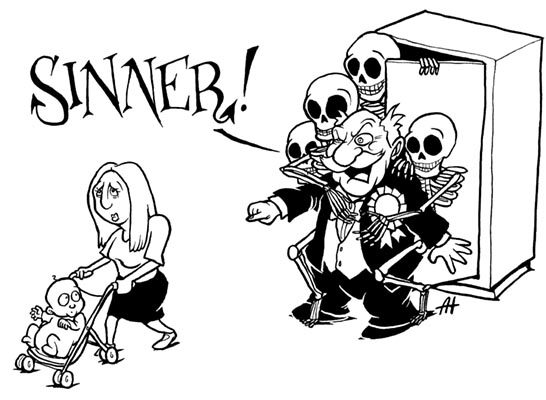
Why Evangelicals Can’t See People as They Are
Evangelicals believe that people are either saved or lost. Every human being, past and present, fits into one of these two categories. There’s no middle ground, no choosing to follow a different path. Either you are a follower of Jesus or you are a follower of Lucifer. Either you are a child of God or you are a child of Satan. According to Evangelicals, most of humanity falls under the lost category. Muslims? Lost. Buddhists? Lost. Catholics? Lost. Humanists? Lost. Shintoists? Lost. Many Evangelicals believe that some of their own tribe is lost too. Calvinists, in particular, are fond of condemning everyone to the Lake of Fire except for the elect — whom all happen to be worshipers of John Calvin.
Evangelicals also believe that all humans are inherently sinful. People don’t become sinners, they are born that way, thanks to Adam and Eve’s fall into sin in the Garden of Eden. Thus, every human being is either a saved sinner or a lost sinner. God says it, end of discussion, or so Evangelicals think anyway.
These facts make it impossible for Evangelicals to see people as they are. Instead of judging people according to their character and behavior, Evangelicals measure them by what the Bible purportedly says about the human condition and human behavior. Many Evangelicals believe that unsaved people can’t truly love or do good works. Why? True love and good works require a personal relationship with Jesus Christ. While unsaved people might “love” others and do what seem to be “good” works, they have selfish, ulterior motives (as if Evangelicals can’t have selfish, ulterior motives). Only born-again, bought-by-the blood, filled-with-the-Holy-Ghost Evangelicals can love and do good works that are pleasing to God. Does what Evangelicals can see with their eyes validate these beliefs? Of course not, but it matters not. The standard for judgment is the Bible, not what can be seen with the eyes and heard with the ears. This is why many Evangelicals believe that I am hiding some sort of secret sin; that the reason I became an atheist is that I wanted to freely indulge my sinful nature. I may keep these things hidden in this life, but someday I will stand before the thrice holy God and in “This Was Your Life” fashion, the Evangelical God will expose my sin for all to see. Some Evangelicals can’t wait to see on judgment day what I have been hiding. Boy, are they going to be disappointed!
The next time an Evangelical tries to befriend you, ask him to tell you honestly what he thinks about you as a person and how you live your life. Not wanting to offend you, many Evangelicals will go out of their way to keep from telling you the truth. Evangelicals figure if they can just make a connection with you, they will eventually be able to say what God thinks about you. Remember, Evangelicals believe they should love what God loves and hate what God hates. Thus, in their minds, they see things as God sees them. After all, the Bible says in 1 Corinthians 2:16 that Evangelicals have “the mind of Christ.” Based on what I know about Evangelicals, I can confidently say that if Evangelicals have the mind of Christ, Jesus is one warped, sick motherfucker.
Sadly, Evangelicals live in a narrow, truncated world that lacks the fullness and wildness found among the unwashed, uncircumcised Philistines of the world. Instead of accepting, loving, and enjoying people as they are, Evangelicals are forced to judge everyone according to their peculiar interpretation of the Protestant Bible. As an atheist, I am free to accept people as they are. I am friends with Christians and heathens alike. Our beliefs rarely perfectly align. I even have a few friends who voted for Donald Trump. I don’t understand how they could do this, but they did. I still have several Evangelical friends. They love posting Christian memes on Facebook, some of which are directly aimed at me, or people like me. I choose to ignore these memes, opting instead to focus on the things we have in common: family, grandchildren, and a love for good food. I could respond in kind, but I choose not to. I just want to love and appreciate them as they are, even if they can’t, deep down, do the same for me. I will always be, in their minds, a dear friend who needs saving. I would love to “save” them too, but at their age, I am content to let them go to the grave with their mythical Jesus.
When Evangelicals see homeless people, they don’t see people in need of housing or mental health care. The homeless are people who are dead in trespasses and sins; people who need the salvation and forgiveness of sins offered only through the Evangelical Jesus. The same could be said of every person struggling with bad choices and behaviors: prostitutes, alcoholics, drug addicts, and preachers, to name a few. Their personal, individual stories matter not. Every life must be filtered through what the Bible says. Thinking this way keeps Evangelicals from seeing people as they are; from enjoying their fellow bipeds, warts and all. The world is filled with audacious, colorful, strange people; people who can and do add much to our lives. Over the past decade, thanks to this blog, I have had the privilege of meeting countless people from all sorts of nationalities and backgrounds. As a Christian Fundamentalist, I lived in a closed-off, black-and-white, homogenous world where I rarely, outside of my evangelistic duties, ran into people different from me. This way of living gave me a stilted, false view of the world. It was only when I began meeting people different from me that my worldview began to expand. As many former Evangelicals can attest, it took actually meeting people different from me: i.e. gays, liberals, people of color, to cure me of bigotry, racism, and homophobia.
As long as Evangelicals view the world through Bible-colored glasses, they will never see people as they are. We face many serious trials in the coming months and years. Successfully tackling these issues requires a willingness for each of us to embrace the differences of others. I’m game, are you?
About Bruce Gerencser
Bruce Gerencser, 62, lives in rural Northwest Ohio with his wife of 41 years. He and his wife have six grown children and twelve grandchildren. Bruce pastored Evangelical churches for twenty-five years in Ohio, Texas, and Michigan. Bruce left the ministry in 2005, and in 2008 he left Christianity. Bruce is now a humanist and an atheist. For more information about Bruce, please read the About page.
Thank you for reading this post. Please share your thoughts in the comment section. If you are a first-time commenter, please read the commenting policy before wowing readers with your words. All first-time comments are moderated. If you would like to contact Bruce directly, please use the contact form to do so.
Donations are always appreciated. Donations on a monthly basis can be made through Patreon. One-time donations can be made through PayPal.
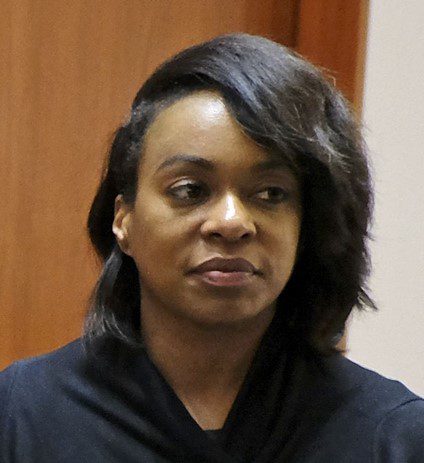
Laura Lloyd, former wife of convicted felon Cordell Jenkins (an Evangelical pastor) , was sentenced to 21 months in prison for lying to federal prosecutors.
After reading a multitude of explicit text messages that showed her then-husband was one of three pastors involved in sex-trafficking a teen girl, Laura Lloyd should have gone straight to notify authorities, a federal court judge said Tuesday.
Instead of helping the victim, the former Lucas County administrator was more concerned with protecting her own image, said Judge Jack Zouhary. He sentenced her to 21 months in prison for lying to federal investigators about her knowledge of the child sex-trafficking scheme at the hands of pastors Cordell Jenkins, Anthony Haynes, and Kenneth Butler.
….
Lloyd previously entered a guilty plea to lying to federal investigators after she lied about various details, such as not knowing the victim’s age, if the victim participated in Abundant Life Ministries youth programs, and if Jenkins was associated with Haynes.
She learned about her ex-husband’s involvement when she read a series of text messages for approximately 30 minutes during a March, 2017 meeting with the victim and her guardian. The next day, the victim disclosed the information to a school guidance counselor, starting the investigation.
Instead of notifying police after the meeting, Lloyd called her husband and Haynes to alert them of a likely investigation.
“How cannot that child, who is there with a guardian, be screaming in your ears to help? Yes, you should have done more. I appreciate that you recognize that now,” Judge Zouhary said.
While Judge Zouhary said he empathized with Lloyd that a person may not know how to handle a situation when first receiving shocking news, the victim was someone Lloyd knew and was a member of the same parish.
Additionally, federal investigators say Lloyd searched online for topics such as, “husband slept with 17 year old,” and “weiner Netflix,” referencing the U.S. congressman who pleaded guilty to federal child exploitation charges and went to prison.
“I’m frankly perplexed of you spending time online to look at how other people caught in a sex crime are able to survive publicly with that situation and continue with their lives,” the judge said. “The focus with you was, ‘How can I survive this situation?’ ”
Previous posts about pastors Cordell Jenkins, Anthony Haynes, and Kenneth Butler: Black Collar Crime: Evangelical Pastor Cordell Jenkins Accused of Sex Trafficking Children, Black Collar Crime: Another Toledo Evangelical Pastor, Kenneth Butler, Accused of Sex Trafficking, Black Collar Crime: Three Toledo, Ohio Evangelical Pastors Indicted on Child Sex Trafficking Charges, Black Collar Crime: Evangelical Pastor Kenneth Butler Pleads Guilty to Child Sex Trafficking Charges, Black Collar Crime: Evangelical Pastor Cordell Jenkins Pleads Guilty to Sex Trafficking, Black Collar Crime: Wife and Stepdaughter of Pastor Anthony Haynes Accused of Kidnapping Victim and Black Collar Crime: Evangelical Pastor Anthony Haynes on Trial for Child Sex Trafficking
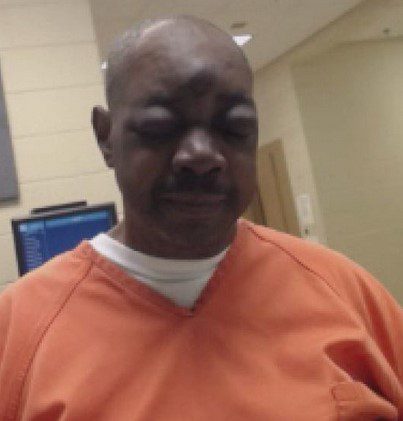
The Black Collar Crime Series relies on public news stories and publicly available information for its content. If any incorrect information is found, please contact Bruce Gerencser. Nothing in this post should be construed as an accusation of guilt. Those accused of crimes are innocent until proven guilty.
Gordon Griffen, pastor of Moore’s Creek Missionary Baptist Church (Website currently offline) in Currie, North Carolina, was charged Tuesday with driving while impaired and two counts of vehicular homicide. The News Reporter reports Griffen allegedly hit head on a car carrying Jolena Long Timmons, 51, and her husband, Donald Timmons, 41, killing them both. The Timmons’ daughter, Tiffany, and her fiancé Adrian Conley, were seriously injured and remain hospitalized.
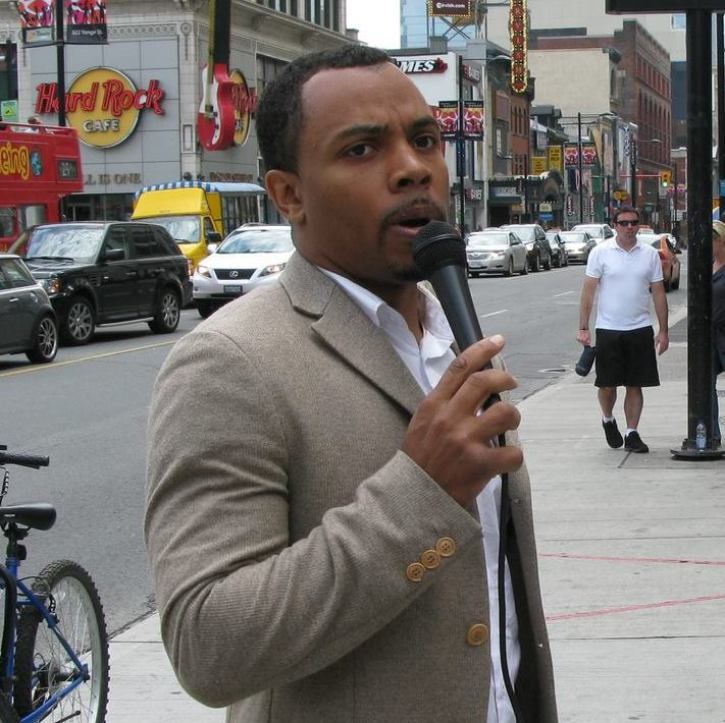
The Black Collar Crime Series relies on public news stories and publicly available information for its content. If any incorrect information is found, please contact Bruce Gerencser. Nothing in this post should be construed as an accusation of guilt. Those accused of crimes are innocent until proven guilty.
David Lynn, a Canadian street preacher, was arrested Tuesday while out doing the work of the Lord and charged with disorderly conduct. Lynn is the founder of Christ’s Forgveness Ministries in Toronto, Canada.
A pastor who was charged with disturbing the peace while preaching with a loudspeaker in the Church-Wellesley Village on Tuesday night is out on bail, and says he is the victim of state discrimination against Christians.
Police responded to a call about a disturbance in the Church and Wellesley neighbourhood shortly before 6 p.m. Tuesday evening.
Video posted online shows pastor David Lynn speaking into a microphone at Church and Wellesley streets and saying that he is “coming out as a Christian.”
Through nearly two hours of footage, Lynn is seen saying that he doesn’t hate anyone, that some people hate Christians and that some people want him to “stay in the closet” as a Christian.
He begins approaching various people to ask if they would tolerate him. When one man asks him to go away, Lynn calls him a bigot.
When others approach to tell Lynn that he is disturbing them, he calls them “hateful.”
After more community members arrived, Lynn was seen arguing with them and his supporters, before police eventually arrested Lynn.
After his release, the 39-year-old pastor said being at Church and Wellesley was just another stop on his map of Toronto, and he and his supporters had been at Kensington Market and Queen and Sherbourne earlier.
….
He said he feels as if he is being discriminated against for being Christian.
“It’s unfortunate that I am subject to this kind of discrimination and bullying and marginalization simply for saying God loves you, there is hope for you, I accept you and tolerate you. I shouldn’t be in this position, I didn’t do anything illegal.”
He said that he was assaulted during the encounter Tuesday but police at the scene refused to hear his complaint.
“It looked as though they had an event waiting for me, and they had some form of hatred against me,” Lynn said.
….
The pastor spent the night in custody and appeared in court at College Park on Wednesday, where a judge released him on bail under conditions he not be anywhere in an area bounded by Bloor Street, Yonge Street, Carlton Street and Jarvis Street.
He also cannot use an audio amplifier that would allow his voice to be heard in that area.
He must also stay away from any location where a Pride Month event is taking place.
David J Lynn is a Planting, Pastoral, and Evangelistic figure who has been used to ignite the fire of Evangelism amongst believers and plant Churches and Para-Church Ministries throughout the world. He was born and raised in Toronto, ON, in Feb 1980 and is a 6th generation Canadian of both Irish and Jamaican lineage. David came from a non-denominational Evangelical background and has been in Planting ministries and Pastoral Ministry for 19 years. He studied theology and pastoral care at both the University of Toronto and Tyndale University and Seminary, has obtained a Master’s Degree in Theology, and is currently pursuing a PhD in Religious Studies. He also serves as a Chaplain within one of Toronto’s major Hospital’s.
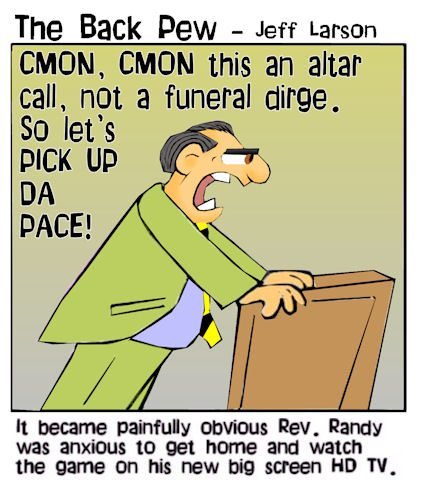
I came of age in the Independent Fundamentalist Baptist (IFB) church movement. At the age of fifteen, I was saved, baptized, and called to preach at Trinity Baptist Church in Findlay, Ohio. Gene Millioni, Ron Johnson, and Bruce Turner were my pastors at the time. (Please see Dear Bruce Turner.) Trinity Baptist was a hyper-evangelistic church affiliated with the Baptist Bible Fellowship. My pastors gave a public altar call at the end of every service. I later would attend Midwestern Baptist College to study for the ministry. Students were required to attend nearby Emmanuel Baptist Church, pastored by college chancellor Dr. Tom Malone. Altar calls were given at every service. Most IFB churches sang Just as I Am during altar calls, but Emmanuel used There is a Fountain Filled With Blood (Drawn from Immanuel’s Veins), by William Cowper. Sinners needing salvation were asked to step out of their seats and walk down the aisle to the front of the church. Once at the altar, a trained soulwinner would kneel with them, share the IFB gospel, and help them pray the sinner’s prayers. This act of faith was called “making a public profession of faith.” Sinners evangelized during the week were expected to come to church the next Sunday and made their conversion public by walking down the aisle.
Baptism was treated in a similar manner. Being immersed in three feet of water in a church baptismal was considered a public declaration of faith. By being baptized, the sinner was saying, “I publicly identify with Jesus.” Many IFB converts are baptized right after the service or the next Sunday. Preachers would often joke that the reason Baptists baptized new converts right away is that they feared never seeing them again. I was saved one week and baptized the next. And several weeks after that, I went forward during the altar call and confessed to Pastor Millioni that I believed God was calling me to preach. I stood before my friends and fellow church members and told them what God was doing in my heart. My declaration was greeted with hearty amens from older congregants. I am sure more than a few of my friends thought, Bruce Gerencser, a preacher? Yeah, right. This too shall pass! It didn’t, and for the next thirty-five years, I preached some version or the other of the Christian gospel, seeking to help sinners see their need for salvation.
Over the first fifty years of my life, I watched thousands of people walk down church aisles and ask Jesus to save them. Often, high pressure, manipulative tactics were used to coerce sinners into getting saved. I heard countless preachers say, “the hardest decision you will ever make in your life is to step out of your seat, walk down the aisle, and make a public profession of faith.” The same line was used when cajoling people into getting baptized. “Publicly identifying with Jesus in baptism is the hardest decision you will ever make!” I later concluded that there was nothing “hard” about these decisions. Here you were among Christians. How “hard” could it be to get saved and baptized? And “public?” What’s “public” about going through the IFB salvation and baptismal ritual in the safety and privacy of a local church filled with likeminded believers?
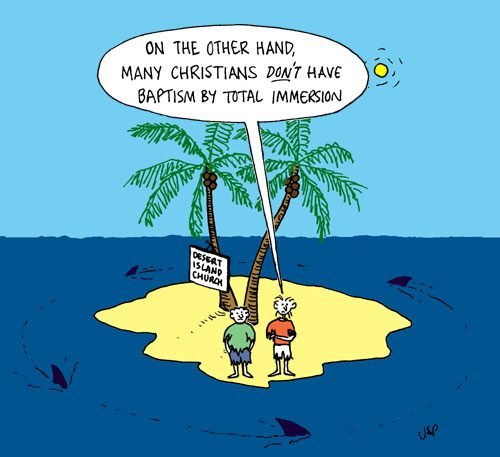
Later in my ministry years, I stopped baptizing new converts at the church. Instead, we would go to a nearby public lake and hold a baptismal service. While not as “public” as the baptisms of first century Christian converts in the book of Acts, being exposed to the gazes of worldly vacationers helped cement the importance and cost of publicly identifying with Christ. Few churches, it seems, are willing to ask much, if anything, from new converts. As long as their asses are in the seats and their Benjamins are in the plate, all is well. It is not uncommon for IFB churches to leads hundreds of sinners to Christ each year, with few of them obediently following the Lord in baptism. Some megachurches these days have pretty much given up on baptizing converts. Once or twice a year, they will “offer” baptism to the unbaptized, but rarely, if ever, stress the importance of the rite.
These days, much to the consternation of IFB preachers and Evangelical pastors, cultural Christianity rules to roost. Christians have “personal” relationships with Jesus, and most of them never share their faith. Recently, the Southern Baptist Convention — the largest Protestant denomination in the United States — reported that their membership and baptism numbers continue to decline. Scores of SBC churches didn’t take in one new member or baptize one new convert. IFB churches, who still think they live in the glory days of the 1970s and 1980s, also face precipitous membership and baptism declines. One-time IFB megachurches now are a shell of what they once were, that is, if they are still in existence. In the 1970s, Polly and I attended Emmanuel Baptist Church in Pontiac, Michigan. Emmanuel was considered one of the largest churches in America. One Sunday, they had over 5,000 people in attendance — a rare feat at the time. Today, its doors are shuttered. The same could be said for numerous other IFB churches — churches that once proudly proclaimed that they were one of the top one hundred churches in America.
It is not uncommon these days for IFB and SBC churches to go weeks and months without “public” professions of faith or a “public” baptisms. More than a few churches, attempting to ward off algae growth or smells that come from stagnant water, have drained their baptismals and use the space to store Christmas decorations or old VBS materials. The best and brightest among such churches will come up with new programs and outreaches they are sure will stop the bleeding and import new life into their churches, but if the past is any indicator, they are doomed for failure. Perhaps, it’s time to admit that Americans are really not that into Jesus anymore; that all people want is eternal life insurance and a place to get married and hold funerals. In other words, IFB and SBC congregants are well on their way to becoming Roman Catholics — morning glories who only bloom on Easter and Christmas.
In one regard, the testimony of such Christians is indeed “public.” The unwashed, uncircumcised Philistines of the world “see” how these people live out their faith, and find themselves saying, “no thanks.” My wife and I visited over a hundred Christian churches after we left the ministry. We were desperately looking for a Christianity that mattered; a congregation that took seriously the teachings of Jesus. While we met all sorts of decent people, we didn’t find one church congregation that was different from the rest. We didn’t find one church that earnestly took Jesus’ commands, teachings, and way of life — as we then understood them — to heart. (Please see But Our Church is DIFFERENT!) We decided that despite differences in liturgy and denominational affiliation, these churches were all pretty much the same. In retrospect, I have no doubt this fact played a part in our eventual abandonment of Christianity. We came to understand that for all their talk about commitment, public professions of faith, and publicly identifying with Jesus, most Evangelical churches were little more than private social clubs for likeminded people; that such clubs attract people who need “forgiveness” and need someone to tell them what to believe and how to live. Sadly, the sheeple underneath the steeple far outnumber people who think for themselves. Those who are able to rationally and critically examine religious beliefs and practices usually end up outside of the churches they once called home.
Conservative Christianity still dominates the American social and political scene. Evangelical culture warriors continue to wage war against secularism, atheism, humanism, socialism, and a culture they believe is going to Hell in a handbasket. Try as they might, these crusaders are fighting a losing battle. Oh, they might win a few skirmishes in the short term — say over abortion — but history suggests that their days are numbered. One need only look at the arc of history in Europe and other Western countries to see where the United States is headed. Old curmudgeons such as myself are unlikely to see secularism and reason vanquish the Devil in our lifetimes, but we hold out hope for our grandchildren and their children. Thanks to global warming, their world will be very different from ours, but we have high hopes that their world will be one where religion has finally been driven back into the four walls of churches where it belongs.
About Bruce Gerencser
Bruce Gerencser, 62, lives in rural Northwest Ohio with his wife of 41 years. He and his wife have six grown children and twelve grandchildren. Bruce pastored Evangelical churches for twenty-five years in Ohio, Texas, and Michigan. Bruce left the ministry in 2005, and in 2008 he left Christianity. Bruce is now a humanist and an atheist. For more information about Bruce, please read the About page.
Thank you for reading this post. Please share your thoughts in the comment section. If you are a first-time commenter, please read the commenting policy before wowing readers with your words. All first-time comments are moderated. If you would like to contact Bruce directly, please use the contact form to do so.
Donations are always appreciated. Donations on a monthly basis can be made through Patreon. One-time donations can be made through PayPal.
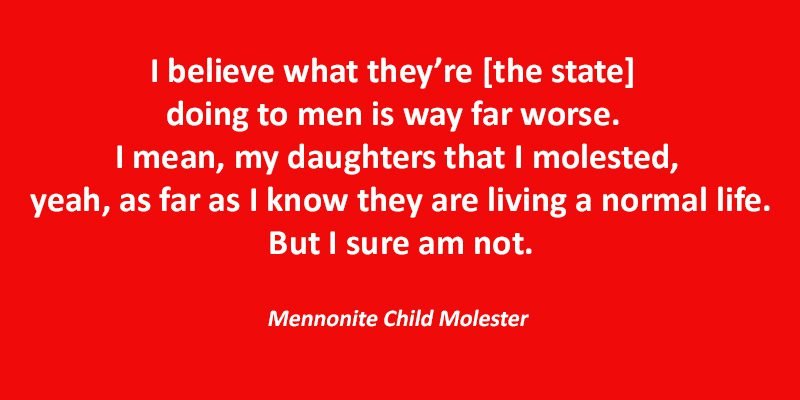
The Toledo Blade recently published a story about how some Amish and Mennonite communities expect victims of child abuse, domestic violence, and other crimes to forgive their attackers and forget the crimes ever happened. Practicing absolute forgiveness, these faith communities expect congregants to forgive regardless of what harm is caused and whether perpetrators are truly sorry for their crimes. The Toledo Blade story focuses on a woman who was excommunicated from her conservative Mennonite church because she refused to forgive her husband — a man who repeatedly sexually molested their daughters over the years. Astoundingly, the Sunday after this woman was excommunicated, her church, with arms opened wide, welcomed her husband back into the church.
After local law enforcement became aware of the husband’s criminal sexual behavior, he confessed his “sins” and was sentenced to five years of probation and 15 years on Pennsylvania’s sex offender registry. You would think that the husband would be penitent and understand why his wife no longer wanted her children anywhere near him. Unfortunately, as is often the case with sex crimes that have a religious component, the husband didn’t truly see the depth of harm he caused:
They held a seminar, and they talked about how that is sin, and I did want to be free before God and confess it and get freedom, Shirk, now 50, said in an April interview. I didn’t want something hid that should have been confessed and taken care of.
I did confession in church and made the confession in church and everybody stood and said they forgave me. I thought it was all good, but I found out that doesn’t make everybody happy.
[He laughed.]
After that, I found out a lot of people carry a lot of hatred for that sin and it’s hard for people to forgive.
….
This got way out of hand. For a little bit of touching that I did wrong. I know that it can be a big emotional thing for the girl, and it can affect their life ever after and stuff like that, and I don’t want to belittle what I did.
“There is no forgiveness for one thing. The state has no forgiveness, and therefore the church has no forgiveness, because the state is on their case that they’ll put the preacher in jail if they don’t report it.
I believe what they’re [the state] doing to men is way far worse. I mean, my daughters that I molested, yeah, as far as I know they are living a normal life. But I sure am not.
The husband continues to try to reconnect with his wife, saying:
I wouldn’t expect a woman to live with a man who is drunk and beating on her. I wouldn’t expect that. But when the church has gotten together and said this man [a convicted child molester] needs forgiveness, it would have been in her place to do that.
As you can see from the husband’s comments, he lacks remorse and contrition, and when it comes right down to it, he doesn’t think what he did is so bad. Hey, at least he didn’t beat his wife and the daughters he molested are living “normal” lives, right? The husband even went so far as to question his wife relationship with God, saying, “I just don’t understand how that [not being reconciled] is going to work out on Judgment Day.” The wife joined another conservative Mennonite church, and while she has been encouraged by them to reconcile with her husband, they have not pressed the matter with her. I am sure some readers are thinking, “WHAT THE FUCK! Why doesn’t she divorce her child-molester husband?” Well, the answer is quite simple: conservative Mennonite congregations do not permit divorce, and doing so would be immediate grounds for excommunication.
Generally, forgiving others is a good idea. Forgiveness fosters peace and helps reconcile people who are at odds with one another. However, practicing absolute forgiveness can and does cause harm, and as this story shows, it allows people to escape responsibility for their behavior. Our goal in life should be to live in ways that don’t require forgiveness, and when we do cause harm to someone, to quickly make amends or restitution. It is up to the person harmed, then, to grant forgiveness. Absolute forgiveness wrongly requires absolution regardless of whether the offender makes things right.
I saw this kind of forgiveness expectation practiced numerous times over the fifty years I spent in the Christian church. Private “sins” were expiated simply by the penitent confessing their bad behavior to God. The Bible says in 1 John 1:9: If we [Christians] confess our sins, he [God] is faithful and just to forgive us our sins, and to cleanse us from all unrighteousness. God promises to cleanse Christians from any and all sin if they will but ask him to do so. And if Christian’s ask, God wipes their sin slates clean, giving them the equivalent of a divine do-over. A sweet deal if you can get it, right?
When Christians commit public “sins” — behaviors that cause public shame to Jesus and his church — they are often brought before congregational leaders or fellow church members and expected to publicly confess their sins. Once the sinner has confessed his sins, he is absolved, and as in the case of private sins, his sin slate of wiped clean.
Whether a person is forgiven by Jesus of private or public sins, it matters not. Once forgiven — and exactly how is that determined? — congregants, including family, spouse, and children, are expected to absolutely forgive the person. Failing to do so is seen as bitterness or pride. I know of several instances where husbands abused their wives, confessed their “sins” before the church, and were granted forgiveness. Their wives were expected to forgive them and move on with life, living with men who just weeks before physically and psychologically abused them. In at least two instances that I know of, abusive husbands were welcomed back into their churches, while their wives were excommunicated for having bitter, judgmental spirits.
Even heinous crimes such as sexual abuse and rape are far too often covered over with expectations of absolute forgiveness. A recent story in the Houston Chronicle revealed that there are dozens of Southern Baptist churches who welcomed sex offenders back into their membership after their convictions. These churches KNEW these men were sex offenders, yet with arms open wide, they said, We forgive you, brother. Welcome to our church. I saw this same behavior on several occasions with Independent Fundamentalist Baptist (IFB) churches. One man, a church bus worker, was caught sexually abusing a teen boy in the church’s basement. He was forgiven by the church and escaped jail time for his crime. Twenty years later, the man was given access to children again, and as sure as the sun comes up in the morning, he sexually abused another child. This time, the man did time for his crime. While the church forgave him, they would not permit him to continue attending their services. With the blessing of his pastor and church leaders, the man joined a nearby IFB church, and to this day can be found there “faithfully” serving Jesus. Astoundingly, his wife — taught by her pastors that there are no grounds for divorce — is still with him.
Whether to forgive should be up to the person harmed. While forgiving others is generally a good idea, churches that demand forgiveness in all circumstances cause harm to people who cannot or are not ready to do so. The act of forgiveness rests with the person harmed. In the case of spousal abuse, child abuse, and sex crimes, churches which demand that victims absolutely forgive their attackers often revictimize and inflict further pain on women and children (and in some instances, men). Victims must be given the space to process what happened to them on their own terms. And if they, for some reason, cannot or will not absolve abusers of their crimes, churches and pastors should accept their decision.
I grew up in a religious culture where absolute forgiveness was expected, regardless of the seriousness of the bad behavior or crime. One of the freeing moments of my life was realizing that I didn’t have to forgive my grandparents (my mother’s father and stepmother) for what they did to me personally, and to my mother and our family in general. My grandparents were go-to-church-three-times-a-week Fundamentalist Christians. Grandpa was a violent drunk before he got saved. After asking Jesus to forgive him of his sins, Grandpa was transformed into a “wonderful” Christian who still was quite violent. And Grandma was not without her own demons. (Please see Dear Ann) Publicly, they were viewed by others as super-duper Christians who loved Jesus with all their heart, soul, and mind. And maybe they did, but underneath their religious veneer lived people prone to psychological and physical abuse.

Years before my mother’s tragic suicide (Please see Barbara), she tried to confront her dad over him sexually abusing her as a child. He told my mom that his past had been forgiven by Jesus and his sins were washed away by the blood of Jesus. He intimated to Mom that if Jesus had forgiven him, so should she. Needless to say, Mom was in no mood to forgive her child molester father. Nor did she plan to forgive his wife, a woman who caused untold heartache and pain. Years later, I reached a place where I had enough of my grandparents’ passive-aggressive behavior. I made it known that I was no longer interested in having a relationship with them. And with that, my grandparents were excised from my life and that of my family. Or so I thought anyway.
In 2003, I moved to Clare, Michigan and became the pastor of a small, struggling Southern Baptist church. One Sunday, as I was preaching, I glanced up and looked out the windows at the back of the building. I was shocked to see my grandmother sitting in her car with her new husband. (Grandpa had miserably died several years before of colon cancer.) I had a Christian version of a WTF moment, and sure enough, after the service my grandmother came up to me as if nothing had ever happened and told me she was living near me with her new hubby and asked if my family and I wanted to have dinner with them sometime. At that moment, I was dying inside, wanting to verbally reduce her to the pile of shit she was. Unfortunately, congregants were standing nearby, so I said, “sure.” Always play the part, Bruce. Always play the part. Several church members told me that they used to attend church with my grandmother. She is a wonderful Christian woman, they said. I responded, there are two sides to every story. Later, I would feel guilty over not forgiving her, so I spent time in prayer asking God to forgive me for being angry and bitter towards my grandmother.
Cleansed of my “sin,” I decided to try to forge a new relationship with my grandmother and her new husband. Polly dreaded doing so, remembering how awful my grandparents were towards her and our children. I played the “what would Jesus do” card, and off to my grandmother’s home we went — which was, ironically, a mile or so away from our home. During our dinner discussion, my grandmother decided to share a family secret that had laid buried for over fifty years: that my father was not my biological father. Granted, I had begun to question my paternity, and have since concluded that my “real” father was likely my mother’s cousin, but it was not my grandmother’s place to share this secret over dinner and in the presence of my wife and children. Why she decided to do this, I’ll never know. This was the last time I ever talked to her. Several months later, we moved back to Ohio, and outside of my grandmother trying to contact me on Facebook, I have had no contact with her. I sent her my Dear Ann article. She never responded. Of course not, it is all under the blood, buried in the deepest seas, never to be remembered again.
As an atheist and a humanist, I have learned that it is okay to not forgive some people; that some people, such as my grandparents, don’t deserve forgiveness; that them going to their graves unforgiven is just punishment for their crimes and ill-behavior. When my grandfather died, I felt nothing and shed not a tear. I was faulted for not attending his funeral, but I didn’t care. I knew it would be an act of Fundamentalist masturbation over his rotting corpse. I would hear wonderful tales about the man, the myth, the legend; the soulwinner who daily sought to evangelize the lost; the man who loved Jesus more than the world. We would not be told, as Paul Harvey used to say, “the rest of the story.”
I am fine with people thinking I am unforgiving; that I should make peace with my grandparents. My grandparents are bad people. No matter how many times they attended church, sang hymns, won souls, and gave money to the church, they were still, at least to family, nasty, judgmental, mean, and violent; guilty of behavior that would land them in jail if they did these things today. Life is too short to spend it around such people. If they need forgiveness, let them ask God for it. As their grandson and the son of the dear woman they physically and psychologically brutalized, I have no intention of granting them pardon. My grandfather is dead. Good riddance. Soon, my grandmother will meet her end too. I shall not weep, except, perhaps, for those harmed by their behavior. Too bad there’s not a Hell. If there were, I know two people who deserve first-class accommodations.
Were you taught that you must, in all circumstances, absolutely forgive? Please share your experiences in the comment section.
About Bruce Gerencser
Bruce Gerencser, 62, lives in rural Northwest Ohio with his wife of 41 years. He and his wife have six grown children and twelve grandchildren. Bruce pastored Evangelical churches for twenty-five years in Ohio, Texas, and Michigan. Bruce left the ministry in 2005, and in 2008 he left Christianity. Bruce is now a humanist and an atheist. For more information about Bruce, please read the About page.
Thank you for reading this post. Please share your thoughts in the comment section. If you are a first-time commenter, please read the commenting policy before wowing readers with your words. All first-time comments are moderated. If you would like to contact Bruce directly, please use the contact form to do so.
Donations are always appreciated. Donations on a monthly basis can be made through Patreon. One-time donations can be made through PayPal.

This is the two hundredth and ninth installment in the Songs of Sacrilege series. This is a series that I would like readers to help me with. If you know of a song that is irreverent towards religion, makes fun of religion, pokes fun at sincerely held religious beliefs, or challenges the firmly held religious beliefs of others, please send me an email.
Today’s Song of Sacrilege is I Take My Chances by Mary Chapin Carpenter.
Lyrics
I took a walk in the rain one day on the wrong side of the tracks
I stood on the rails till I saw that train
Just to see how my heart would react
Now some people say that you shouldn’t tempt fate
And for them I would not disagree
But I never learned nothing from playing it safe
I say fate should not tempt me
I take my chances, I don’t mind working without a net
I take my chances, I take my chances every chance I get
I sat alone in the dark one night, tuning in by remote
I found a preacher who spoke of the light but there was brimstone in his throat
He’d show me the way according to him in return for my personal check
I flipped my channel back to CNN and I lit another cigarette
I take my chances, forgiveness doesn’t come with a debt
I take my chances, I take my chances every chance I get
I’ve crossed lines of words and wire and both have cut me deep
I’ve been frozen out and I’ve been on fire and the tears are mine to weep
Now I can cry until I laugh and laugh until I cry
So cut the deck right in half, I’ll play from either side
I take my chances, I pay my dollar and I place my bet
I take my chances, I take my chances every chance I get
I take my chances, I don’t cling to remorse or regret
I take my chances, I take my chances every chance I get
I take my chances
I take my chances
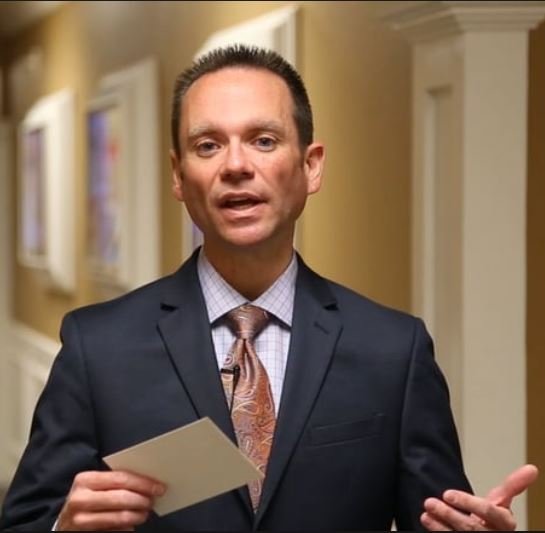
The Black Collar Crime Series relies on public news stories and publicly available information for its content. If any incorrect information is found, please contact Bruce Gerencser. Nothing in this post should be construed as an accusation of guilt. Those accused of crimes are innocent until proven guilty.
In May 2018, Cameron Giovanelli, the president of Golden State Baptist College — an Independent Fundamentalist Baptist (IFB) institution operated by Pastor Jack Trieber and North Valley Baptist Church in Santa Clara, California, was accused of repeatedly sexually assaulting a church teenager when he was the pastor of Calvary Baptist Church in Dundalk, Maryland. Giovanelli denied the allegations and exited stage right to points unknown. ( Please read the previous post titled, Black Collar Crime: IFB Preacher Cameron Giovanelli Accused of Sexual Assault)
Today, the Fort Worth Star-Telegram reported that Giovanelli is now the associate pastor of Immanuel Baptist Church in Jacksonville, Florida. Giovanelli also plans to help Immanuel Baptist’s pastor, Greg Neal, start a new unaccredited IFB secondary institution called North Florida Baptist College. Neal, himself, was caught up in a sex scandal in 2011 when he was accused of video voyeurism. You can read more about Neal’s brush with the law here and here. Neal, unfortunately, escaped prosecution.
I have no doubt that a number IFB pastors and churches will recommend North Florida Baptist College to its students. Neal is a graduate of Hyles-Anderson College. Deeply influenced by disgraced pastor Jack Hyles, I am sure that both Neal and Giovanneli subscribe to the Hyles rule: If You Didn’t See It, It Didn’t Happen. (Please see Sexual Abuse and the Jack Hyles Rule: If You Didn’t See It, It Didn’t Happen)
Giovaneli’s college bio page states:
Cameron Giovanelli was born on June 29, 1977. He was saved on September 20, 1990, while living in Rohnert Park, CA. In 1994, he surrendered to preach while attending a youth conference in Santa Clara, California. Following his graduation, he attended Golden State Baptist College where he met his wife, Sarah, and they both graduated in 2000.
After graduating from Bible college, Cameron Giovanelli served as a youth pastor for several years in Napa, CA; as an associate pastor in Manteca, California; and then, as a pastor in the fall of 2003. He pastored a growing church on the east coast for eleven years before accepting a position at his alma mater as the president. In 2018, he and his family moved to Jacksonville, Florida, and began serving as an assistant pastor at the Immanuel Baptist Church under the leadership of Pastor Greg Neal. Now, with the announcement of North Florida Baptist College, Cameron Giovanelli has been asked and has accepted the role of president.
Cameron and Sarah Giovanelli have three children. Together, the Giovanelli family has seen the Lord work in remarkable ways, and they are excited about this next phase of their ministry life. Cameron Giovanelli is a seasoned servant and soldier of the cross, and it is with great excitement that North Florida Baptist College has called him to lead the way of training up the next generation of church leaders.
No mention of the allegations against him. I wonder why? Sadly, the IFB church movement tends to be a shameless lot, and the latest escapades of Neal and Giovanelli only reinforce that notion. As I perused North Florida Baptist College’s twitter account, I noticed that IFB luminary Bob Gray, Sr. is a follower. No shock there. Gay is a Hyles loyalist, and has stood by several IFB preachers accused of sexual misconduct. I followed North Florida Baptist, and it took less than sixty-seconds for them to do the following:

They also reported my account and got it temporarily blocked. I wonder what Giovanelli, Neal, and Company are trying to hide?
Sorry boys, but I ain’t going away.
Bruce Gerencser, 66, lives in rural Northwest Ohio with his wife of 45 years. He and his wife have six grown children and thirteen grandchildren. Bruce pastored Evangelical churches for twenty-five years in Ohio, Texas, and Michigan. Bruce left the ministry in 2005, and in 2008 he left Christianity. Bruce is now a humanist and an atheist.
Connect with me on social media:
Your comments are welcome and appreciated. All first-time comments are moderated. Please read the commenting rules before commenting.
You can email Bruce via the Contact Form.